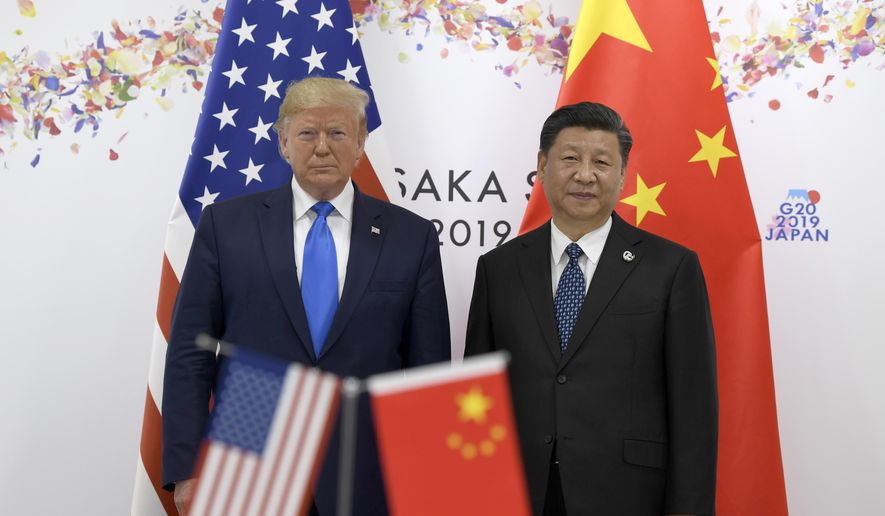The past 40 years of formal, diplomatic engagement between the U.S. and China has failed as Beijing has emerged as a “generational threat,” a new report authored by Congressional Republicans concludes.
The China Task Force, which is made up of Republican House members after Democratic members refused to join the committee that was intended to be bipartisan, calls for increases to the defense budget, funding for modernization of all three legs of the nuclear triad as well as development of ground-launched cruise and ballistic missiles, and establishing and carrying out an Indo-Pacific initiative to deter China’s aggression in the region.
The report concludes that the U.S.’ existing policy towards China has “often turned a blind eye to the CCP’s human rights violations, economic malfeasance, expansionist aggression, empty promises, as well as the CCP’s deep commitment to a hostile Communist ideology that drives this malign behavior.”
“This strategy has, simply put, failed,” the lawmakers said.
The group, which is comprised of 15 Republican members on 11 various congressional committees, highlighted China’s human rights violations against ethnic minorities including Uyghur Muslims, the implementation of a national security law on Hong Kong, and early efforts to suppress the severity of the coronavirus outbreak.
“This series of wake-up calls is revealing how CCP ideology is undermining the core principles of the international system and putting Americans’ safety and prosperity at risk,” the lawmakers said in a report summary obtained by The Washington Times.
They said the COVID-19 pandemic, which has led to the deaths of over one million people around the world, has “exposed various U.S. supply chain vulnerabilities, the dangers of U.S. overreliance on the PRC, and the need for a more robust domestic medical and technological manufacturing capacity.”
While placing tight restrictions on the flow of capital with the world’s second-largest economy is an unpopular stance among most lawmakers, the task force suggested implementing tighter controls on investments with certain Chinese firms.
Also Wednesday, the House Permanent Select Committee on Intelligence released its findings of a two-year investigation into the United States’ China policy.
The Democrat-led panel found that “the United States’ Intelligence Community has not sufficiently adapted to a changing geopolitical and technological environment increasingly shaped by a rising China and the growing importance of interlocking non-military transnational threats, such as global health, economic security, and climate change.”
“Absent a significant realignment of resources, the U.S. government and intelligence community will fail to achieve the outcomes required to enable continued U.S. competition with China on the global stage for decades to come, and to protect the U.S. health and security,” the panel warned.
While offering a similarly bleak conclusion on the United States’ China posture, it presented a somewhat optimistic outlook into future navigation of the Washington-Beijing relationship.
“The good news is that we still have time to adapt,” committee Chairman Adam Schiff said in a statement.
“We should all have the same goal — ensuring the U.S. and its intelligence community is prepared to effectively take on the China challenge,” the California Democrat said. “We must do everything possible to accurately predict and characterize Beijing’s intent, or we will continue to struggle to understand how and why the leadership of the CCP makes decisions, and fail to respond effectively.”
Democrats and Republicans have found some common ground in Washington’s rebuke of Beijing, particularly on human and civil rights issues in recent years. But the task force took aim at the lack of Democratic presence on the panel.
“Despite numerous and repeated invitations over a series of months, House Democrats refused to join or contribute to the China Task Force,” the lawmakers said. “The GOP had no choice but to move forward independently due to the exigency of the threat.”
When the task force was established in May, top Democrats claimed that the White House was putting an added emphasis on China’s role in the coronavirus pandemic in an effort to distract from the severity of the outbreak in the U.S.
“What the president is saying about China is interesting. It’s an interesting diversion,” House Speaker Nancy Pelosi said in a press conference at the time.
The U.S. has reported the highest number of COVID-19 cases at more than 7.1 million, and deaths from the virus, at 206,036, according to the Johns Hopkins University tracker.
“To preserve democracy and freedom around the world, the U.S. must act decisively with our allies to regain the initiative,” the lawmakers said. “Addressing such malign conduct can no longer be one of many priorities for our respective governments, but rather the organizing principle of the free world.”
• Lauren Toms can be reached at lmeier@washingtontimes.com.




Please read our comment policy before commenting.